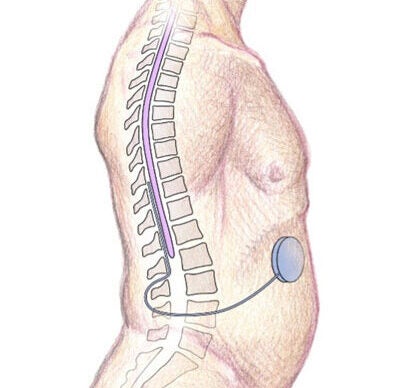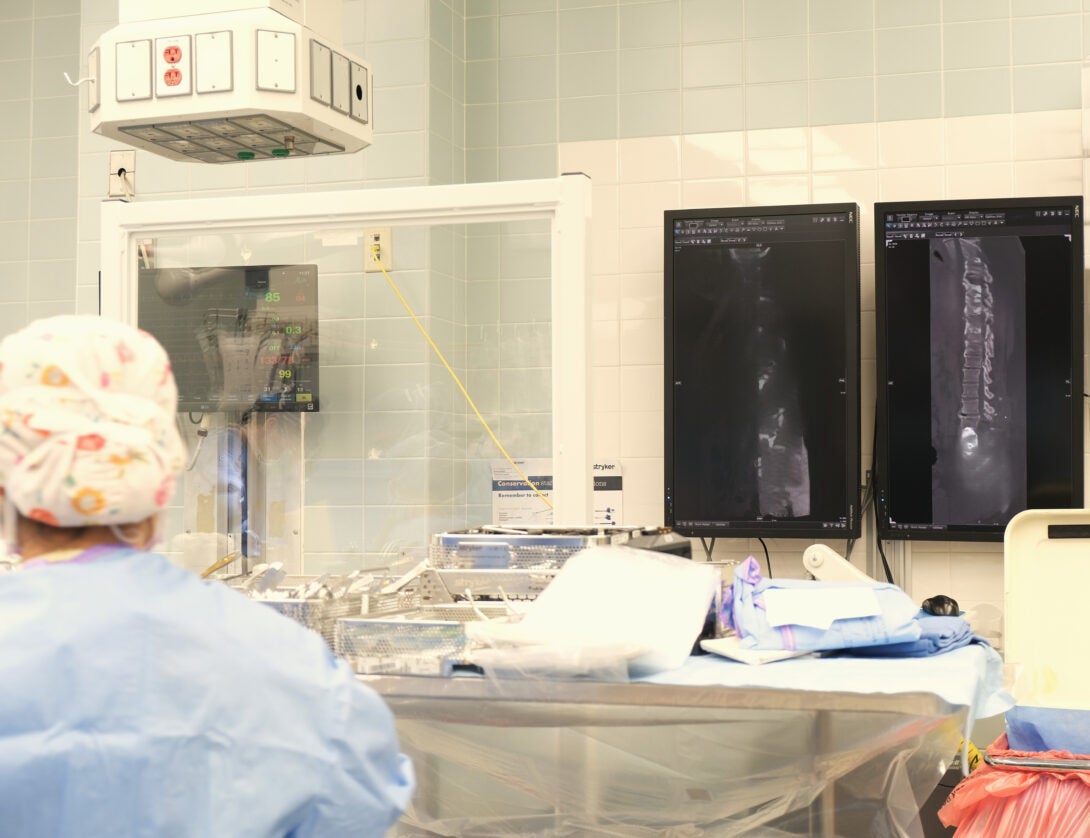Intrathecal Drug Pumps: A Solution for MS Patients
Intrathecal Drug Pumps: A Solution for MS Patients Heading link

Multiple sclerosis affects nearly one million people in the U.S., with various symptoms of severe disability. It is the most prominent neurological disease in young adults. One common symptom is spasticity, a condition that causes painful muscle tightness and involuntary spasms. At UI Health, this month serves as an opportunity to showcase its extensive approach to MS care.
UI Health stands apart by offering intrathecal drug pumps as a pivotal solution for managing spasticity and chronic pain. With a team of specialists dedicated to individualized treatment, UI Health is committed to patients receiving the most advanced options to improve mobility and reduce discomfort.
But to fully appreciate the benefits of these treatments, it’s important to understand how MS affects the body.
Understanding MS
MS is a chronic disease that affects the central nervous system by damaging the protective covering of nerve fibers, known as myelin. This damage interrupts communication between the brain and the rest of the body, leading to a wide range of symptoms depending on the location and severity of the nerve damage. Symptoms often include chronic pain, immobility, memory lapses, mood changes, numbness, vision impairment, and weakness.
While the exact cause of MS is unknown, it is considered an autoimmune disorder since the body’s immune system mistakenly attacks the myelin sheath. Over time, the continued attack can result in potentially long-term disability.
Types of MS—primary-progressive, secondary-progressive, relapsing-remitting, and progressive-relapsing—are determined by their progression and the frequency of relapses.
Since there is no cure for MS yet, UI Health offers a range of advanced treatments to help patients manage the disease, recover from attacks, and slow disease progression. From medicine-modifying therapies and physical rehabilitation to innovative options like intrathecal drug pumps, UI Health provides comprehensive care catered to each MS patient’s needs.
Intrathecal Drug Pumps Heading link
Intrathecal Drug Pumps
“It is rare for symptoms to just go away for patients with multiple sclerosis,” said Dr. Konstantin Slavin, a neurosurgeon and professor at the University of Illinois Chicago (UIC). In cases where spasticity becomes severe and unmanageable with medication alone, surgical intervention, such as intrathecal drug pumps, could be the most effective option.
The intrathecal space is the fluid-filled area between the spinal cord and its protective membranes. The device consists of a pump and a catheter, both components are surgically implanted to deliver medication directly to the spinal cord and nerves. One incision is made in the abdomen to place the pump, while another is made in the back to position the catheter into the spine. The catheter is then tunneled to the abdomen, connecting to the pump. Like clockwork, the pump is electronically programmed to release precise doses of medication at designated intervals into the spine.
By infusing medication directly into this space, the pump offers targeted relief. Additionally, because the medication is delivered exactly where it’s needed, intrathecal pumps require significantly lower microgram doses when compared to milligrams provided by pills. This targeted approach not only enhances effectiveness but also minimizes the side effects commonly associated with pill use.
“When medication is taken orally,” Dr. Slavin said, “it has to travel through the body, and only a small amount can reach the spinal cord. If we inject it into the spinal fluid, it goes directly where it is needed to treat the patient.”
Patients return for refills every three to six months—a straightforward outpatient procedure. The pump’s internal battery sustains function for approximately seven years. The pump also archives the patient’s treatment information and dosages into its memory so doctors can access the details.
What to Know Heading link

What to Know
While the surgical procedure is minimally invasive and relatively quick, the UI Health team prioritizes patient learning by educating individuals to fully understand the potential risks. After implantation, patients are asked to closely monitor their body’s response to the medication to make sure the proper dosage is administered, as well as the best time of day for the treatment to be released by the pump.
“The risks mostly have to do with not getting enough medication or too much. If there is too much, the medication may have side effects leading to weakness and fatigue. If it is not enough, it is not properly treating the muscle pain,” said Dr. Slavin.
Depending on the patient’s condition, adjustments to the infusion rates can be made, including alterations to dosage and time setting. These modifications are guided by patient feedback, symptom monitoring, and regular clinical assessments for optimal pain relief. If side effects occur, the infusion can be paused or recalibrated to prevent complications while maintaining treatment.
“It’s also testable,” Dr. Slavin stated. “Before we implant the pump, we can test patients through a spinal tap, which is an injection into their spinal fluid, to see how they respond to the treatment. For many other surgeries, we cannot test the treatment beforehand.”
Treatment Options Heading link
Treatment Options
As a leader in MS care, patients have access to the latest advancements in treatment options. UI Health is committed to managing symptoms and slowing the progression of MS through a multidisciplinary team approach that combines expertise from surgeons, neurologists, anesthesiologists, and pain management specialists to offer innovative solutions. This collaborative method allows every aspect of a patient’s condition to be carefully evaluated and treated, leading to more effective, long-term symptom care.
“We have an experienced team of doctors and surgeons. The first surgical pump placement conducted here was over 25 years ago,” Dr. Slavin stated. “UI Health has only honed its skills and expertise since then. This practice manages well over 200 pumps for patients with multiple sclerosis from all over the world.”
UI Health’s integration of surgical technology and specialized care continues to set the standard for excellence in treatment and patient outcomes.
For more questions and information on treatment options, please visit: Neurology and Neurosurgery or call 312.355.0510.